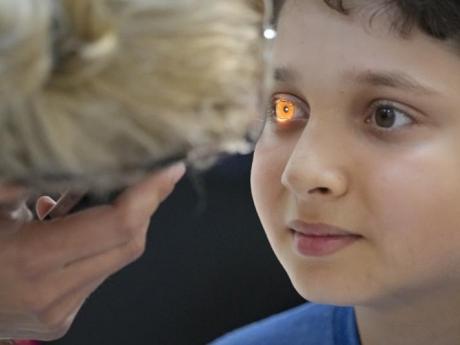UN adopts first resolution on vision, aims to help one billion
UNITED NATIONS (AP) — The United Nations General Assembly approved its first-ever resolution on vision, calling for its 193 member nations to ensure access to eye care for everyone in their countries which would contribute to a global effort to help at least 1.1 billion people with vision impairment who currently lack eye services by 2030.
The “Vision for Everyone” resolution, sponsored by Bangladesh, Antigua, and Ireland, and co-sponsored by over 100 countries, was adopted Friday by consensus by the world body.
It encourages countries to institute a “whole of government approach to eye care.” And it calls on international financial institutions and donors to provide targeted financing, especially for developing countries, to address the increasing impact of vision loss on economic and social development.
According to the resolution, “at least two billion people are living with vision impairment or blindness and 1.1 billion people have a vision impairment that could have been prevented or is yet to be addressed.”
“Global eye care needs are projected to increase substantially, with half the global population expected to be living with a vision impairment by 2050,” the resolution says.
Bangladesh's UN Ambassador Rabab Fatima introduced the resolution, stressing its first-ever focus on vision, and calling it “a long-overdue recognition of the central role that healthy vision plays in human life and for sustainable development.”
She said over 90% of the 1.1 billion people worldwide with vision loss live in low- and middle-income countries, adding that 55% of blind people are women and girls.
On average, the loss of sight costs the global economy “a staggering amount of $411 billion in productivity each year,” Fatima said.
And access to eye care services can increase household spending per capita by 88% “and the odds of obtaining paid employment by 10%.”
While General Assembly resolutions are not legally binding, they do reflect global opinion.
Fatima said it was critical for the assembly to convey the UN's “unequivocal commitment to ensure proper eye care facilities for everyone, everywhere, to prevent conditions which can lead to serious and permanent damages.”
She called the resolution an “opportunity to change the lives of millions who are living in blindness or with impaired vision.”
The resolution stresses that access to eye care is essential to achieve UN goals for 2030 to end poverty and hunger, ensure healthy lives and quality education, and reduce inequality.
It calls on all nations to mobilise resources and support to ensure eye care for all people in their countries, in order to reach at least 1.1 billion people worldwide “who have a vision impairment and currently do not have access to the eye care services that they need” by 2030.
Follow The Gleaner on Twitter and Instagram @JamaicaGleaner and on Facebook @GleanerJamaica. Send us a message on WhatsApp at 1-876-499-0169 or email us at onlinefeedback@gleanerjm.com or editors@gleanerjm.com.

